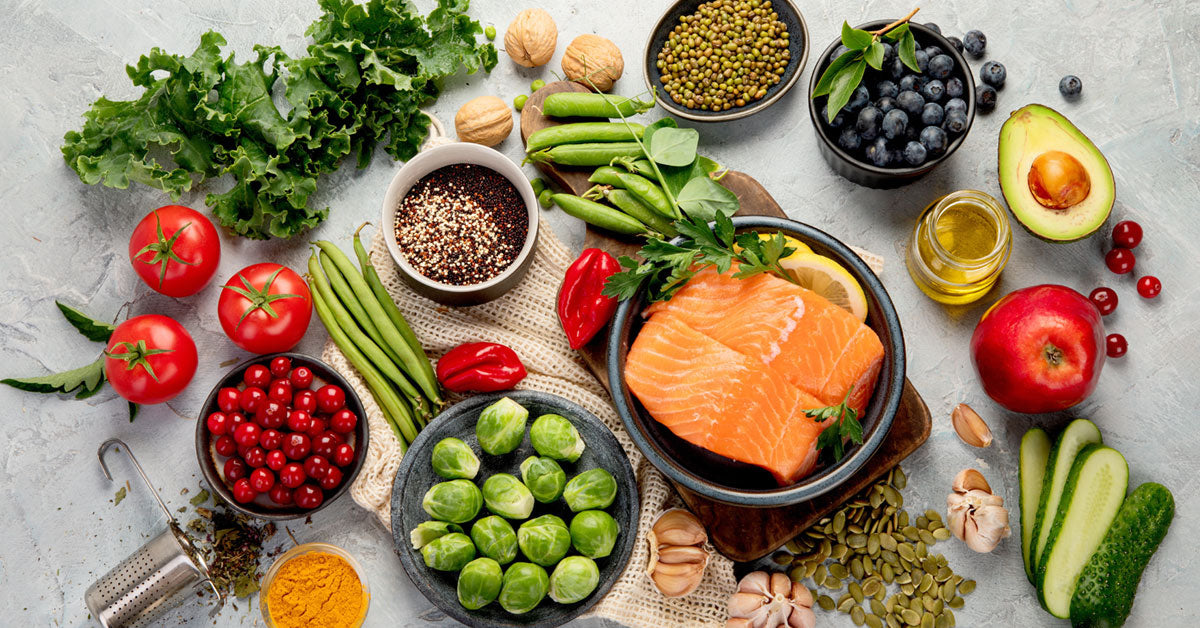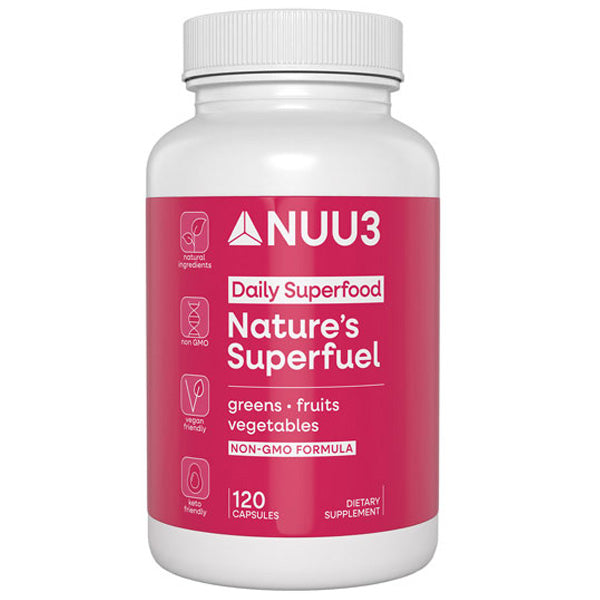The Green Mediterranean Diet: Complete Guide!

If you’ve researched healthy eating, then you’ve most likely already heard about the world's most popular regimen - the Mediterranean diet. There is significant evidence [1] to suggest that this meal plan can improve cardiovascular health and reduce the risk of hypertension, lipid imbalance, and obesity.
The Mediterranean diet includes primarily whole grains, seafood, fruits, vegetables, and olive oil, and it supplies the body with all of the nutrients, vitamins, and minerals it requires. However, what if we told you that there’s an even greener, more nutrition-packed version that can take your well-being to new heights? Welcome to the world of the Green Mediterranean diet. In this article, we’ll discuss the details of this incredibly healthy regimen and teach you how to follow it.
What Is the Green Mediterranean Diet?
The Green Mediterranean diet (or Green-MED) is an enhanced version of the standard Mediterranean diet. This regimen focuses on consuming primarily plant-based and whole foods while cutting down on meat and other animal products.
While it's acceptable to eat meat, eggs, or fish occasionally, the majority of the time the diet calls for you to replace them with alternative proteins such as quinoa, nuts, beans, or tofu. The regimen excludes red meat, sweets, and processed foods completely, but it does allow for up to one glass of red wine daily [2].
The Green-MED diet[3] also includes additional healthy snacks each day like a handful of walnuts, 3 to 4 cups of green tea, or a shake with 100 grams of Mankai duckweed.
Why the Green Mediterranean Diet?
According to a 2022 study of patients with abdominal obesity and dyslipidemia published in Genome Medicine[4], both the regular Mediterranean diet (MED) and the Green Mediterranean diet led to positive changes in body weight and markers of heart health. The researchers concluded that this was due to participants eating more plant-based foods and less meat.
Experts also discovered that following the Green-MED diet closely and including foods like Mankai and green tea led to more significant positive transformations in gut bacteria. The healthy changes in the gut microbiome that occur on the Green-MED diet also have a positive impact on weight and heart health.
How Does the Green Mediterranean Diet Work?
What is the Green Mediterranean diet, and how does it work? Green-MED is a modified version of the standard Mediterranean diet which places a strong emphasis on consuming a variety of plant-based foods. Many of the foods included are low in calories and high in fiber, which helps with weight management by curbing appetite and reducing overall caloric intake.
While the diet does allow for eggs, fish, or meat in limited amounts, it recommends deriving most of your protein from alternative, plant-based sources that are lower in saturated fats and cholesterol. However, to follow the diet properly, you must consume balanced, nutrient-rich meals daily. Variety makes the meals more enjoyable and satisfying.
Is the Green Mediterranean Diet Healthier?
Recent research[5] concluded that following the Green Mediterranean diet food list reduces visceral fat the most (14%) compared to a regular healthy diet (4.5%) and the standard MED diet (7%).
The green version offers a range of health benefits and could be even more beneficial than the original Mediterranean diet. For example, the regimen is associated with a lower risk of developing conditions like heart disease, diabetes, cognitive decline, and depression. Additionally, the Green Mediterranean diet is more effective at lowering cholesterol and blood pressure, and it could offer better protection against age-related brain atrophy.
What Are the Benefits of the Green Mediterranean Diet?
Following the Green Mediterranean diet can do wonders for your health[6]. Some of the most potent benefits include:
- Reducing inflammation
- Lowering insulin resistance
- Decreasing the risk of type 2 diabetes and metabolic issues
- Helping with weight management (i.e. may lower BMI and shrink waist)
- Decreasing the risk of stroke and heart disease
- Balancing blood pressure and cholesterol levels
- Keeping you feeling full and satiated
A 2021 study[7] examined several different diets to learn which was best for improving the health of patients with abdominal obesity and high cholesterol. The 294 participants were assigned one of 3 different diets: a regimen following healthy dietary guidelines, the Mediterranean diet, or the Green Mediterranean diet. All groups also carried out regular physical activity. Both of the Mediterranean diet groups ate walnuts daily, which are packed with nutrients. The green Mediterranean diet group also drank green tea and had a Mankai shake every day.
The results indicated that after 18 months, participants who followed the green Mediterranean diet food list had the best health outcomes. These volunteers experienced the highest reduction in liver fat, and their risk of developing non-alcoholic fatty liver disease was decreased by half. Both Mediterranean diet groups experienced equal weight loss overall.
The researchers also concluded that people who ate more Mankai and walnuts and less red and processed meat had better health results overall, including positive changes in gut bacteria and blood biomarkers.
The Green Mediterranean Diet vs. The Standard Mediterranean Diet
There’s a lot of confusion when it comes to distinguishing the two Mediterranean meal plans. While the standard MED and Green-MED diets are quite similar, there are a couple of key features[8] that set them apart.
- Green-MED excludes processed foods and red meat: The traditional Mediterranean diet is a bit more lenient in this regard, allowing for small servings of pork, lean beef, or lamb a few times a month. While processed foods are discouraged on both diets, you might come across recipes that include processed meats like chorizo in the standard version.
- Green-MED is much more focused on eating plant-based foods: While the diet doesn't specify a precise increase compared to the standard version, it encourages you to consume more plant-based foods. The types of foods recommended are generally the same for both, however, the Green Mediterranean Diet suggests cutting down on animal proteins like poultry and fish and replacing them with nuts, legumes, and beans.
- Green-MED is all about extras, like green tea, walnuts, and duckweed: Walnuts and green tea are recommended on both diets, although they are stressed more on the Green-MED regimen. Duckweed, however, is not on the Mediterranean standard diet mostly because it’s very hard to find and not for sale in most grocery stores.
Components of a Green Mediterranean Diet
The Green-MED diet is all about supporting overall health and supplying the body with rich sources of nutrients, vitamins, and minerals[9]. This is the detailed Green Mediterranean diet food list:
- Whole grains
- Green tea
- Dark leafy greens (i.e. mustard greens, lettuce, spinach, kale)
- Non-starchy vegetables (i.e. green beans, cauliflower, broccoli, zucchini, bell peppers, onions)
- Herbs and spices (i.e. turmeric, cumin, fennel)
- Legumes (i.e. lentils, beans, chickpeas)
- Seeds (i.e. flaxseed, sesame seeds, chia seeds)
- Avocados and avocado oil
- Olives and extra-virgin olive oil
- Berries
- Leafy greens
- Fatty fish
- Nuts and seeds
- Spices (i.e. turmeric, fennel, cumin)
- Tomatoes
- Fresh fruit (i.e. berries, oranges, lemons, figs)
- Nuts (i.e. walnuts, almonds)
- Tahini and other organic seed butter
- Mankai (duckweed) or other aquatic plants packed with protein
- Red wine
Note: The Green-MED diet[10] eating plan is not specifically vegan, as it includes foods like ricotta, cottage cheese, eggs, and other animal-based products. You can also eat poultry and fish in small amounts, but the diet requires you to steer clear of processed and red meats.
How Do I Start a Green Mediterranean Diet?
If you don’t think you can handle a drastic change to your dietary pattern, gradually incorporate more plant-based foods into your meals. Start by having meat-free meals a few times a week, and explore plant-based protein sources like lentils and tofu. You can also upgrade your wellness routine by taking multivitamin supplements daily, as they are both delicious and packed with vitamins and minerals.
Is the Green Mediterranean Diet Worth Trying?
The green Mediterranean diet food list is certainly worth trying, especially if you want a heart-healthy daily regimen rich in nutrients. It’s also beneficial for those trying to lose weight, as this meal plan includes foods that are low in calories and high in fiber and other nutrients. In addition, as an excellent complement to the Green-MED diet, don’t miss out on the opportunity to supercharge your health by taking NUU3 Nature's Superfuel supplement daily.
It’s important to keep in mind that the Green-MED diet is not suitable for everyone. Before changing your regimen consult with a registered dietitian for advice, especially if you have specific dietary restrictions or a medical condition.
Easing Into the Green Mediterranean Diet
To avoid feeling overwhelmed, take it slow when making the switch to the Green-MED diet by starting with small adjustments to your current regimen. Find creative ways to include walnuts in your meals, like adding them to salads and sauces or using them as a topping for yogurt or oatmeal. Experiment with adding Mankai to your diet by eating small portions and gradually incorporating it into different recipes. Pay attention to how your body responds to these changes and note any improvements in digestion and energy levels.
By taking NUU3 Apple Cider Vinegar Gummies daily along with your new diet, you can further enhance your body and mind. Packed with apple cider vinegar, these tasty gummies offer a convenient and delicious way to support your overall health and well-being.
FAQs
What foods are not allowed on the Green Mediterranean diet?
You are not allowed to consume Trans fats, refined grains, refined sugars, or processed foods on the Mediterranean diet. In addition, limit your consumption of full-fat and processed dairy products.
Can you drink coffee on the green Mediterranean diet?
Yes, you can drink coffee on the green Mediterranean diet. Just be mindful of the amount of sugar you add and how much you consume, as moderation is key.
What is the most nutritious green?
The most nutritious green is kale, which is a super food due to its exceptional nutrient density. Kale is especially rich in fiber, manganese, folate, and Vitamins A, B6, C, and K..
Conclusion
By moving away from red meats and processed foods, the Green Mediterranean diet helps you take an important step to improve your health. While you can still include foods like fish and poultry, the main goal of this diet is to increase how much veggie and other plant-based foods you eat. Plus, you get to enjoy coffee and a cup of green tea. The diet helps you manage your blood sugar levels, improve insulin sensitivity, and even lower inflammation levels in your body so it’s worth trying.
References
1] ↑https://pubmed.ncbi.nlm.nih.gov/34423871/
2] ↑https://www.health.com/green-mediterranean-diet-7095181
3] ↑https://www.everydayhealth.com/mediterranean-diet/what-is-the-green-mediterranean-diet-and-should-you-try-it/
4] ↑https://www.ncbi.nlm.nih.gov/pmc/articles/PMC8908597/
5] ↑https://bmcmedicine.biomedcentral.com/articles/10.1186/s12916-022-02525-8
6] ↑https://draxe.com/nutrition/green-mediterranean-diet/
7] ↑https://www.ncbi.nlm.nih.gov/pmc/articles/PMC8515100/
8] ↑https://medmunch.com/green-mediterranean-diet-meal-plan/
9] ↑https://www.healthifyme.com/blog/web-stories/add-these-superfoods-to-your-diet/
10] ↑https://marathonhandbook.com/green-mediterranean-diet-plan/











